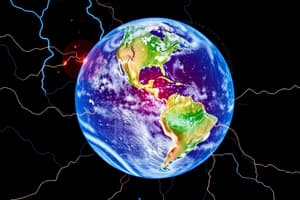Podcast
Questions and Answers
What is geology?
What is geology?
The scientific study of the solid Earth, including rocks, minerals, soils, sediments, and organic materials.
What do atmospheric scientists study?
What do atmospheric scientists study?
Earth's atmosphere, particularly weather patterns and climate change.
How do geologists contribute to understanding the Earth's history?
How do geologists contribute to understanding the Earth's history?
By examining fossil records, ice cores, and dating rocks.
What are some practical applications of geology and atmospheric sciences?
What are some practical applications of geology and atmospheric sciences?
How does the integration of physics and earth science benefit researchers?
How does the integration of physics and earth science benefit researchers?
What is physics?
What is physics?
What does quantum mechanics describe?
What does quantum mechanics describe?
What is general relativity?
What is general relativity?
What is earth science focused on?
What is earth science focused on?
Name two disciplines within earth science.
Name two disciplines within earth science.
How does physics contribute to our understanding of the cosmos?
How does physics contribute to our understanding of the cosmos?
Study Notes
Science Overview
Science is a systematic enterprise that builds and organizes knowledge in the form of testable explanations and predictions about the universe. It comprises various fields, including physics and earth science, which represent two distinct ways of understanding the world around us. Here's a brief overview of these disciplines within the context of science:
Physics
Physics is the branch of natural philosophy concerned with matter and energy, their interactions, and relations to space and time. This field seeks to understand how the physical universe behaves by studying its fundamental constituents—particles such as electrons and quarks—and analyzing forces between them like gravity, electricity, and magnetism. Physics has been instrumental in shaping our understanding of the cosmos, ranging from quantum mechanics to general relativity.
Key aspects of physics include:
- Quantum Mechanics: A theory describing the behavior of particles at extremely small scales, dealing with phenomena such as superconductivity and high-temperature superconductors.
- General Relativity: Einstein’s theory explaining the law of gravitation and the curvature of spacetime, providing insights into black holes, wormholes, and other exotic objects.
Earth Science
Earth Science focuses on the study of our planet and its natural processes. This interdisciplinary field includes geology, atmospheric sciences, oceanography, and ecology. Key areas of interest in Earth Science include:
- Geology: The scientific study of the solid Earth, including rocks, minerals, soils, sediments, and organic materials. Geologists examine the history of the earth through fossil records, ice cores, and dating rocks.
- Atmospheric Sciences: The study of Earth's atmosphere, particularly weather patterns and climate change. Atmospheric scientists explore how human activities impact air quality, greenhouse gases, and ozone depletion.
The integration of physics and earth science allows researchers to better understand complex systems such as earthquakes, volcano eruptions, climatic changes, and pollution control measures. These fields also have practical applications in engineering, technology development, environmental protection, and resource management.
Studying That Suits You
Use AI to generate personalized quizzes and flashcards to suit your learning preferences.
Description
Explore the fundamental principles and key areas of interest in physics and earth science. Learn about quantum mechanics, general relativity, geology, atmospheric sciences, and their practical applications in understanding the world around us.




